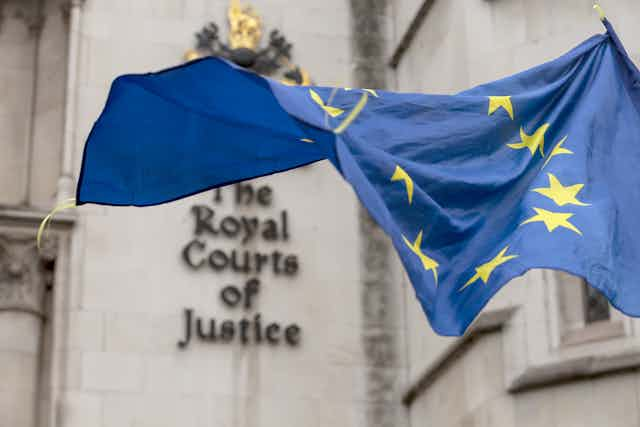Britain’s membership of the European single market has become the most contentious issue in the post-Brexit debate. And the legal issues involved are proving rather tricky.
Britain’s single market membership is the product of not one, but two international organisations and their rules – the European Union (EU) and the European Economic Area (EEA). This means that interesting questions (and legal cases) are now arising on how Brexit will work.
Most are by now familiar with Article 50 of the EU Treaty – the formal trigger to leaving the EU. But now, it seems there is another article that might need to be triggered – Article 127 of the EEA Agreement – to leave the single market.
Separate to the EU’s rules, the UK is also signed up to the rules of the EEA. These have been signed up to by 28 EU member states along with Norway, Liechtenstein and Iceland. Thanks to the EEA Agreement, these three states share Europe’s single market with the 28 EU states. But little else – no customs union, or common agriculture or fisheries policies.
The EEA owes its 1994 creation to the erstwhile European Commission president, Jacques Delors. His idea was that the EEA would be a kind of economic space absorbing European states into the single market, but without allowing them into what is now the EU – thereby allowing the 12 members of the then European Community (now EU) to continue working toward the creation of the euro currency, as well as internal market reform.

The EEA worked out, but somewhat differently than anticipated. There are only three non-EU participant states, rather than the large number Delors envisaged. Some (Finland, Austria and Sweden) joined the EU itself. One, Switzerland, opted out of the EEA entirely.
Non-EU EEA members are also effectively in what has been termed a “fax union” – meaning that Norway, Liechtenstein and Iceland basically sit at the end of a fax machine waiting for the EU to send them single market rules to implement.
The jury’s out
Awkwardly, the UK electorate was not asked if they wanted to reject the single market – merely the EU. A 52% majority voted to leave that. Before the referendum, many Brexiteers (including UKIP’s Nigel Farage) extolled Norway’s EEA-based status. Now, however, many assert that respect for the June 23 vote requires rejecting the single market entirely, including EEA rules. They say voters sought to end contributions, restrict migration, and avoid even the most indirect application of the European Court of Justice decisions – and that these aims would be frustrated by staying in the EEA.
Single market remainers counter that there was no majority to leave the single market: many reasons for voting for Brexit had nothing to do with the single market (such as a belief that money would be saved, opposition by farmers to the common agricultural policy and fishermen to the fisheries policy – or even Labour voters to austerity). They note future UK contributions will be required anyway to gain market access (as Brexit minister David Davis has now conceded), that restrictions on migration (albeit admittedly limited ones) are possible under Article 112 of the EEA Agreement.
The law is unclear about what will happen to the UK’s single market status if it leaves the EU. The UK government asserts that the UK is party to the EEA agreement only in its capacity as an EU member state. So once the UK leaves the EU, it will automatically cease to be a member of the EEA. But that point is arguable.

Article 127 of the EEA Agreement expressly provides only one way of withdrawing: giving 12 months notice to other parties. If that provision applies, then just quitting the EU won’t be enough for the UK to leave the EEA’s single market. The UK will have to give express notice to leave the EEA too.
But maybe it doesn’t apply. Other provisions of the EEA Agreement seem to assume EU members (like the UK) are only signed up to it because they are in the EU. Leave the EU, this argument goes, and you cause a “fundamental change of circumstances” or a “material breach” under international law governing treaties. So, legally speaking, other states can take the view that you have quit the EEA.
Legal challenges
All very confusing. We may soon find out who is right, though. The pro-single market group, British Influence, is seeking a judicial review focused on the government’s EEA position. British Influence would like the Article 127-is-needed view to prevail (and parliament to then refuse to consent to Article 127 notice and the UK to live happily ever after – or at least for a very long time – in the EEA).
There are UK law issues here too. And political issues. The Supreme Court is currently weighing up a legal challenge brought by Gina Miller regarding whether or not parliament’s consent is needed under UK law to trigger Article 50.
If the Supreme Court say “no”, parliamentary consent will hardly be needed to trigger Article 127 either. That would be the end of the Article 127 story. The government will just give the Article 127 notice and say goodbye to the EEA.
If the Supreme Court say “yes”, then parliament’s consent will be needed for EEA exit too. But here is the catch: parliamentarians may not give it, claiming there has been no referendum on the UK’s single market membership.
Continued EEA membership would have huge consequences for Britain’s economic well-being for generations. So the courts – and potentially parliament too – have weighty issues to ponder. First in the Miller case. And now perhaps in the British Influence case too.

